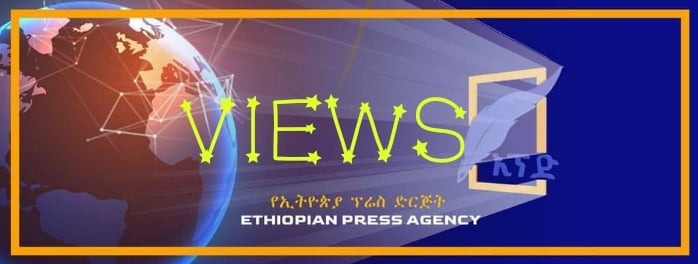
BY BLEN M DIRIBA
Part I
Elections have their own ritualistic aspect that arouse emotions and channel them towards collective national symbols and common fate – whether or not it is held under authoritarian or democratic regimes. However, the upcoming election in Ethiopia is reportedly overshadowed by disquiet and perturbation from different corners, such as domestic ethno-religious tensions, the Tigray crisis and GERD related national security threats posed by Egypt and Sudan. The current leadership under Prime Minister Abiy Ahmed, nonetheless, insists on holding elections regardless of the mounting internal and external pressure to disrupt it.
According to the government, the upcoming election is an epochal juncture in modern Ethiopian political history, a ray of hope for the long awaited democratization and development of the nation. For some opponents of the government (including the TPLF and OLF ‘Shene’ terrorists) and the international community (i.e. – US, UK and the EU), the election is a fait accompli that adds no value to Ethiopia’s effort to democratize itself, and rather emboldens dictatorship and poses a grave risk of instability that could further lead to disintegration given the current ‘fragility’ of the state and the ‘debilitation’ of the federal government. This apprehension is also shared and amplified by ethnocentric domestic politicians, and at times, the academic and political elites and public figures with genuine concerns.
With that note, this article analyses whether the upcoming election is a watershed in modern Ethiopian political history or a fait accompli. In doing so, it examines the government’s position and the rationale behind pushing for election. It also scrutinizes the structural fitness, institutional capability and security insurance on the side of the Ethiopian government to hold elections under the current conditions.
Finally, it predicts the possible outcome of the election whether it is democratic, or cosmetic – and analyses what that means to Ethiopia’s democratic future.
From EPRDF to Prosperity Party: Ethiopia’s Pilgrim to ‘Democratic’ Election
In April, 2018, Abiy Ahmed Ali was legitimately Elected by his party to take the post of premiership and the position of chairmanship of the EPRDF (Ethiopian People Revolutionary Democracy Front) – a TPLF led authoritarian party that has claimed 100 percent victory back in 2015. The EPRDF is a coalition of four ethnic based political parties namely the Amhara National Democratic Movement (ANDM), Oromo People Democratic Organisation (OPDO), Southern Ethiopia People Democratic Movement (SEPDM) and Tigre People Liberation Front (TPLF). After overthrowing the Communist Derg Dictatorship through armed struggle, EPRDF was Africa’s largest political party that has dominated Ethiopian politics for nearly three decades ( since 1991); until it was finally disbanded by Prime Minister Abiy in November, 2019. In December 2019, Abiy Ahmed formally introduced Prosperity party as a substitute of EPRDF merging most of the constituent parties of the coalition except the TPLF – that has long opposed and blocked Abiy Ahmed’s effort to reinvent the country’s politics.
TPLF considered the ‘demolition’ of the EPRDF as a betrayal of the front’s foundational ideology of ‘revolutionary democracy’ and abandonment of the ‘Federalist Forces’. Thus, TPLF leadership isolated itself from the merging with Prosperity Party, and organized and financed destabilizing forces to disrupt the reform process championed by Abiy Ahmed. However, their dreadful greed to power and money was the major source of their grievance as they struggled to stand to lose the geopolitical supremacy and security dominance they have dishonorably relished in every tier of government over the past three decades.
Thus, they have turned every stone, from questioning the legitimacy of the prime minister whom they vote for to lead their party and the nation, to holding an illegitimate regional election defying the federal government and the national election board. Even worse, they organized and financed domestic terrorism to facilitate a brutal attack against non Tigre civilians across the country, mainly targeting Amharas. [to fume anger against the ”Oromo‘ Leadership of Prosperity Party].
Finally, in a mixture of conviction, stupidity and arrogance, they treasonously attacked one of the major commands of the Ethiopian National Defense Force, i.e. the Northern Command, and committed horrendous crimes against the army – paving the way to the current crisis in Tigray.
In the midst of all these, Abiy Ahmed’s government kept reluctantly pushing for an election to be held despite the security and other concerns rose from both internal and external powers that kept oscillating their position only to stand opposing whatever is decided by the government. When the government insists on an election, they have security concerns. When the government cancelled the election back in 2020 on public health concerns due to COVID 19, they had democratic concerns – and by the time, not only did they start questioning the legitimacy of the prime minister, but also called for the establishment of a transitional government ; thereby shattering down their own credibility.
Regardless, the National Election Board has decided to hold the election in mid June, 2021 with zero possibility of extension or cancellation. On this election, Prosperity party, Ethiopian Citizens for Social Justice (EZEMA), National Movement of Amhara (NAMA), Balderas, All Ethiopian Unity (AEU), Enat Party, and Hiber Ethiopia are among the major parties participating in the upcoming election; while Oromo Liberation Front and Oromo Federalist Congress (OFC) pulls themselves out. OFC, under the official leadership of Prof. Merarra Gudina and the shadow leadership of the Islamist Oromo extremist Jawar Mohammed, is one of the post Abiy Ahmed TPLF allies in the “Federalist” political circle that has continued to publicly push TPLF’s agenda against Abiy Ahmed – from the “Illegitimacy” narrative to calling for cancellation of the National election and establishment of transitional government.
Similarly, the OLF, a former violent insurgency group that was authorized to return back home and engage in civil politics under PM Abiy’s leadership, has been pushing TPLF’s agenda to delegitimize the Prime Minister and degrade public confidence in his administration. In a mischievous approach, they declared the absence of national government commencing 10th of Oct, 2020 and called for the establishment of a transitional ‘federalist’ government as they grow to understand election will not buy them the ticket to the power they have immense thrust for.
The OLF “Shene”, the alleged military wing of the OLF under Dawud Ibsa’s leadership [an ideological and strategically of the TPLF and OFC], was recently proclaimed as a terrorist group along with the TPLF – who organized, financed and committed domestic terror in different regions of Ethiopia – mainly targeting civilians and law enforcement officers (ENDF included]- with the intent to undermine and overthrow the federal government and take control of or dismantle the nation. After facing devastating defeat by the ENDF on the war they themselves instigated, the TPLFs have been engaged in a cycle of disinformation campaign playing the victims of their own crime – with the aim to degrade the international image of Ethiopia and mount diplomatic pressure on Abiy Ahmed’s administration – for defending the sovereignty of the nation.
Why against the Election? The Rationale Behind
Whether “misled” by the TPLF misinformation propaganda or intentionally manipulating the internal sociopolitical rift to advance their own interest in the Horn of Africa, the west has now picked the side of terror and chaos entrepreneurs in an effort to undermine Abiy Ahmed’s leadership, and the upcoming election. It’s been a while now since the western politicians and media started portraying the election as a fait accompli that delivers nothing significant than extending the office term for the “Authoritarian” Abiy Ahmed, or a watershed that is going to turn the nation into ashes.
To justify this roguish approach, the west (particularly the US, UK and EU) cites the “security threats” resulted from the ‘war’ in the north where TPLF overwhelmingly obliterated itself, and all the myriad of massacres TPLF’s “Ethno-Federalist” and separatist allies orchestrated and perpetrated in various parts of the country [with the alleged support of external ‘enemies’ like Egypt and Sudan, of course]. Further than that, the US has now declared a gimmicky sanction ‘targeting’ Ethiopia’s economy and security under the pretext of ‘Humanitarian Crisis’ in Tigray. However, when carefully assessed, the ‘sanction’ and overall diplomatic pressure [including regarding the election] is more or less a red light for Abiy Ahmed to seriously negotiate Ethiopia’s interest in line with the western [particularly US’s] interest in the HOA, triggered by the latter’s apprehension by the growing geopolitical and military influence of China, Russia and now Iran and UAE in Ethiopia [and the HOA]. The sanction, as declared by the US State Department, provides no significant economic restriction [as it allows aid on almost all sectors] and extends the security aid restriction from President Trump’s era. Its wording is chosen carefully, avoiding irresponsible incrimination of the Ethiopian or the Eritrean government– while making TPLF terrorists liable for the atrocities and simultaneously applying the travel restriction imposed on ETH and ERI GOVT officials. Meanwhile, it avoided controversial terms like Genocide, Ethnic Cleansing etc; which were irresponsibly used by the US Secretary of State Anthony Blinken, and other western law makers, ‘humanitarians’/human rights groups and media personnel who kept echoing TPLF’s disinformation propaganda. The role of Egyptian lobby and the Arab League’s political pressure is also of significant contribution towards the current sanctimonious position of the US against Ethiopia.
Editor’s Note: The views entertained in this article do not necessarily reflect the stance of The Ethiopian Herald
The Ethiopian Herald June 17/2021




